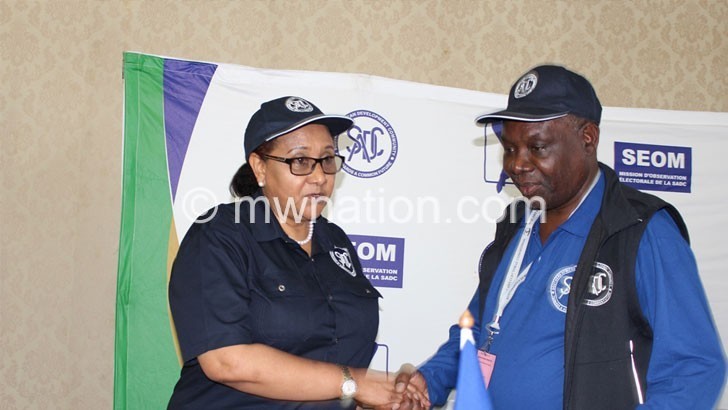Sadc calls for electoral reforms
A Sadc Election Observation Mission (Seom) preliminary report has said while Tuesday’s tripartite elections were professionally managed, it observed a number of electoral processes that need reforms.
Addressing the media in Lilongwe at a joint briefing with the Comesa Election Observer Mission yesterday, alternate head of the Seom Kalombo Mwansa said both the campaign and voting were conducted in a generally peaceful environment, but both Sadc and Comesa observer missions identified several areas for improvement.
Both Sadc and Comesa observer missions applauded MEC for managing the elections in a professional manner. They also acknowledged the impressive turnout of citizens who voted in a largely peaceful manner.
In its preliminary report, the Seom said it was aware that the Special Law Commission was tasked with electoral reforms in Malawi after the 2014 Tripartite Elections and it presented its final report to the Ministry of Justice and Constitutional Affairs in April 2017.

However, the mission recommended that electoral laws still need to be reformed, among others, on appointment of MEC commissioners, period for voter registration and the role of the State broadcaster, among others.
On voter registration, the mission said while MEC commissioners are appointed by the President in consultation with leaders of the political parties represented in Parliament, “there is, however, need for the appointment process to be improved to enhance inclusivity, transparency and good governance”.
The Seom further observed that MEC’s failure to meet its initial target of registering nine million voters—only managing to register over 6.8 million voters—should call for law review so that electoral laws allow continuous voter registration in between election cycles which can increase the registration period.
It also observed that MBC did not provide neutral and equal news coverage for all political parties and candidates as required by law, stating the taxpayer-funded broadcaster could have done more to increase news coverage of all political parties.
The report further urged stakeholders to improve the social, cultural and political environment to enhance the participation and inclusion of female candidates in line with the Sadc Protocol on Gender and Development.
The observer mission also cited the killings and abductions of people with albinism as a threat that limited rights to freedoms of movement, association and ultimately participation in the elections.
Seom noted several stakeholder concerns regarding allegations of selective election-related criminal law enforcement, stating there is need to improve the level of stakeholder confidence in the law enforcement agencies.
In a separate statement, the Comesa observer mission, which is led by Hope Kivengere—a member of the Comesa committee of elders—said MEC’s decision to allow specific categories of persons to vote in polling centres they did not register should have been communicated earlier.
Comesa further recommended that MEC should collaborate more with civil society organisations (CSOs) in future to conduct civic education and further urged government to declare the election day a public holiday.
In an interview, political scientist Nandini Patel said the Sadc recommendations are not surprising and reflect the situation in the country.
She added the country will need to review the electoral reform process once the elections are over.
She said: “It’s true the elections have been conducted professionally. As far as the reforms are concerned, we need to implement the recommendation on continuous registration, it’s a new and good recommendation.
“On the appointment recommendation, it’s a long standing recommendation. People have called for ways to ensure that commissioners are appointed on merit. When elections are over, we need to revisit the reforms.”
Following the preliminary reports, both Seom and Comesa Election Observer Mission are due to release final reports on the elections once MEC announces winners of the presidential, parliamentary and ward councillor race.
Seom deployed 41 officers in 27 of the country’s 28 districts to observe and monitor the Tuesday elections.
The revival and success of the electoral law review might be dependent on the will of the Executive of the incoming president or the composition in terms of majority party in the soon to be instituted Parliament.
Despite strong pressure from CSOs and donors, who funded the Special Law Commission reforms on electoral laws, the previous Parliament rejected the reforms.





